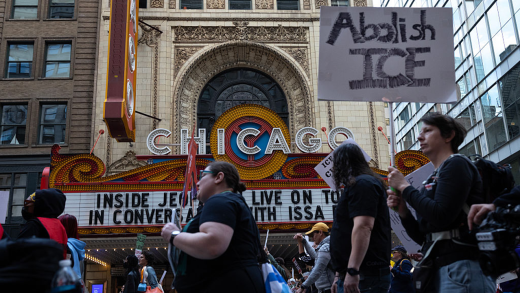In Gaza, children do not merely experience fear amid the constant bombardment and death. Fear has come to redefine the simplest concepts in every aspect of their lives.
When my three-year-old niece, Rose, touched a wall for the first time, it was as if she were touching something alien – something that didn’t belong to her world. Her tiny hand reached out hesitantly, then recoiled suddenly, as if struck by an electric shock.
“Will it fall?” she whispered, trembling.
She thought the solid wall would collapse, just as our tent – where the two of us live along with seven other members of our family – collapses whenever the sea winds rage. Rose has never known a wall that doesn’t fall. In her world, permanence is a fantasy, and everything around her is subject to collapse.
Rose is the daughter of my eldest brother. With both of her parents away working – one as a teacher and the other as a doctor – I have been her main caretaker since birth, feeding her, snuggling her to calm her down, putting her to sleep. She was one year old when the genocide started. She has been sleeping in my arms for the past two years. My embrace is the only sense of safety she knows.
In Rose’s world, walls are unreliable, air is suspicious, water is a hazard, and sound is not a sign of life – but a warning of its end.
Last month, I had to take Rose to one of Gaza’s few remaining hospitals. She, like other children in our displacement camp, had gotten a rash. Her small body could no longer endure the harsh summer and the lack of clean water.
The reception area was overwhelmed. We waited with dozens of other patients – every mother carrying a story of pain on her chest, and every child looking like Rose: Pale face, fragile body, wide eyes pleading for a life that doesn’t resemble death.
In the corner of the corridor, a fan was blowing – yes, a working fan. I hadn’t seen one in months. The children approached it hesitantly, as though they were in the presence of something sacred, trying to touch the breeze.
I wanted Rose to feel it. I wanted her to know that not all wind is destructive.
But the moment the breeze from the fan touched her face, she screamed – the same scream she lets out when a fighter jet bombs our neighbourhood. She clutched at my clothes, her tiny fingers digging into the fabric, her body trembling violently.
She thought the air itself now signalled another attack from the sky. She now associates any sudden movement or sound with bombing. Even a fan feels like a threat.
I pulled her back quickly, holding her tightly against my chest, apologising without words.
How can I explain to a child that air doesn’t hurt? That a fan isn’t a warplane? That light isn’t a bomb? That the ceiling won’t fall?
On another occasion, Rose was playing with a cup of water, and she spilled it and slipped. She didn’t cry from pain, but from panic. In her mind, even such a small incident is a terrifying event.
At night, as we tried to sleep through darkness, heat, and the sounds of shelling, a nearby explosion shook our tent. Rose jumped and clutched her right ear.
“Auntie Rola … did my ear fly off?” she asked, in heartbreaking innocence.
I didn’t understand at first. Then I remembered that our neighbour had lost his ear in a strike on the market weeks ago. Rose thought the explosion had stolen her ear, just like one did his.
This is her life now – an existence wrapped in constant fear.
Rose is just one of hundreds of thousands of children in Gaza, each living through the painful trauma of war and genocide. Their world is not shaped by innocence and play, but by survival and fear.
Even if the war were to end tomorrow, it would leave behind a whole generation of Palestinian children whose childhood has been shattered. It is a trauma of immense proportions – one that would take years, perhaps decades, to address.
And this process will have to start with redefining the basic concepts of life: That walls do not usually fall, that the breeze is safe, that sound does not kill.
The views expressed in this article are the author’s own and do not necessarily reflect Al Jazeera’s editorial stance.


